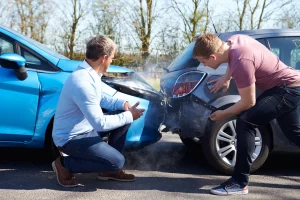What to Do After a Car Accident That Isn’t Your Fault

Being involved in a car accident, regardless of whose fault it is, can feel distressing and confusing. It’s not just about dealing with the physical discomfort of injuries and getting appropriate medical care – you’re also likely challenged by trying to deal with the insurance company for the at-fault person, wondering what will happen next, and how the claims process works.
Accidents happen unexpectedly, so knowing what steps to take right after one dramatically reduces stress levels while ensuring you comply with all legal requirements.
Fortunately, you don’t have to handle these situations alone; The Callahan Law Firm can help.
Our team of trial lawyers has over 25 years of experience successfully helping people in injury cases against powerful insurance companies and large corporations.
We understand how critical it is to have a lawyer and legal team in your corner advocating for your rights. We intentionally take on a limited number of cases at any given time, which enables us to concentrate fully on each client, ensuring their case gets the attention it deserves.
If you’re wondering what to do after a car accident and need help with a claim, don’t hesitate to contact us to schedule a no-cost consultation.
5 Immediate Steps to Take After a Car Accident
After being involved in a car accident, it’s typical to ask yourself “What do I do now?”. Understanding the immediate steps to take following an accident can be instrumental in protecting both your health and any claim you may have. Here’s what you should do:
1. Contact Emergency Services and Ensure Safety at The Accident Scene
Safety is paramount after an accident; dial 911 for police assistance as soon as possible and take precautions not to cause further damage or injuries while waiting for them to arrive. If possible, move your vehicle out of any moving lanes of traffic to a safe place nearby while you wait on the police.
2. Gather Necessary Information From All Parties Involved
Obtain names, contact info, driver’s license numbers, and insurance details from all parties involved in the accident. This information is essential when filing an insurance claim or if further legal action becomes necessary. In addition, if possible make sure to get contact information from any eyewitness to the crash.
3. Document the Accident Scene With Photos or Videos
Photos and videos can help establish what happened and why. Capturing different angles of your vehicle, other vehicles involved, nearby signs, roadway markings, and any visible injuries can provide critical information for your claim.
4. Seek Medical Attention Even for Seemingly Minor Injuries
Your health is important, so don’t hesitate to accept appropriate immediate medical attention when necessary including going to the hospital via ambulance. Additionally, going to an emergency room or urgent care clinic later that day or the next day, should be considered when necessary. After a motor vehicle crash, adrenaline can mask pain and discomfort, and you may not know you’re suffering from injuries. It is not uncommon in many instances for a person to wake up the next day or in the following days with symptoms attributable to the crash. And if an injury claim is made at a later time, your medical records will outline your injuries, the medical diagnosis, and any recommendation for further medical care.
5. Notify Your Insurance Company
Notify your insurance company about the accident as soon as possible. Standard in an insurance policy is that an insured – you – have a duty to cooperate with your own insurance company which includes letting them know what happened. This is different, however, from dealing with the at-fault person’s insurance company who will not have your best interest at heart but instead will be looking out for their insured – the at-fault driver – and doing everything they can to minimize the amount of money they must eventually pay. Be careful if or when with the at-fault insurance company, its adjusters and investigators regardless of how kind or caring they may appear to be. Again, their interest is in paying the least amount of money possible, and ideally nothing at all to you.
These steps lay the groundwork for anything that will follow, whether it’s an insurance claim or legal proceedings.
Preserving Evidence and Documentation
Once the dust settles after your car accident, you still have a critical role – preserving evidence and documentation.
Importance of Preserving Evidence
Compiling reliable evidence is crucial to support your claim. Photographs from the scene, video if possible, witness information, the police crash report—every bit helps paint a clear picture of what happened during your accident.
Doing this can be the difference between getting fair compensation for your injuries and damages.
Maintain Records Of Medical Treatments and Expenses
Keep track of all medical treatment related to injuries you sustained in the crash, including medical provider contact information, medical records, medical bills, prescriptions, diagnoses, after-visit summaries, and similar documentation.
Obtain Police Report And Review It For Accuracy
Make sure you obtain a copy of the police report filed after your accident, as it usually carries significant weight when determining who was at fault for an auto collision. The report contains important details about the identify of those involved in the crash, traffic laws violated, eyewitness information and accounts, information about road conditions, and anything else the officer deems relevant.

Seeking Legal Guidance
Following a car accident, obtaining sound legal advice is crucial – it can make the difference in securing full compensation for your injuries and damages. These professionals have an in-depth knowledge of the law, allowing them to navigate any legal proceedings and issues that may arise. Here are the primary ways they will help:
Evaluate Your Case and Guide You Through The Legal Process
A personal injury lawyer will evaluate your case by listening to your side of what happened and reviewing and collecting evidence. This allows them to guide you through the entire legal process so you don’t make any mistakes that will negatively impact your claim.
Calculate Damages
Determining and calculating damages is another critical service an attorney provides. They consider various factors such as present and future medical costs, lost wages due to inability to work, physical impairment, pain, mental anguish, and potentially more, to determine how much to ask for and what is a reasonable amount to accept.
Determine Liability
An experienced personal injury attorney also plays a crucial role in determining liability – identifying who’s at fault based on available evidence and applying existing laws accordingly.
Negotiate With Insurance Companies
Your lawyer will negotiate with the insurance company to ensure they are treating you fairly and offer compensation that is acceptable to you. This process can be very stressful and allowing your attorney to do the negotiating takes that burden off your shoulders.
Ensure Your Claim is Filed on Time
Timely filing of a lawsuit, when necessary, is critical; in Texas, the statute of limitations for filing a lawsuit based on negligence in a car accident case is 2 years from the incident, meaning a claimant must file a lawsuit within two years of your car accident. And if this is not done, the person will lose their right to ever make that claim. However, exceptions exist which may either shorten or lengthen this deadline. It is crucial to understand that every case is different, which is why it is essential to consult with a personal injury lawyer to determine the statute of limitations deadline that applies to each particular case.
To ensure you understand these complexities and file within the required timeline without jeopardizing your right to compensation, consult with an attorney promptly following your accident.
The Callahan Law Firm’s Expertise In Car Accident Cases
At The Callahan Law Firm, we have a long history in successfully representing individuals and families in car accident cases in Houston, Pasadena, and throughout the state of Texas, which means we understand relevant laws and have the experience needed to get you what you deserve. Our firm is dedicated to fighting for our clients’ rights by providing the personalized attention each client deserves. At The Callahan Law Firm, you are more than just a case to us.
Dealing with Insurance Companies
Dealing with insurance companies after a car accident can be an uphill battle – there’s a lot of red tape to cut through, and decisions you’ll have to make that could drastically affect your case.
Navigating the Claims Process
The insurance claims process is notoriously complex. Being aware of the importance of timelines, how to accurately detail losses, and avoiding common pitfalls—like being tricked by an insurance adjuster into saying something that hurts your claim—are crucial when making a claim.
Tactics Used By Insurance Adjusters
One of the most important things to know is that insurance companies are for-profit companies and are focused on their bottom line rather than paying you what you deserve.
Insurance adjusters will engage in tactics like requesting recorded statements, asking questions in a way that many times results in a person saying something that is misconstrued and later used against them, or offering quick lowball settlements, hoping you’ll accept before realizing the extent of your injuries and the true value of your claim.
Consult an Attorney Before Accepting any Settlement Offers
Before talking to an opposing insurance company, agreeing or signing anything from the insurance company involved, it is best to consult with a knowledgeable personal injury attorney. An experienced attorney will ensure that all potential damages are included in your claim and ensure you receive fair compensation.
Pursuing Compensation for Car Accidents Not Your Fault
In situations where you’re the victim of a car accident that isn’t your fault, it’s only fair that you are compensated for the injuries and damages suffered. The process can be tedious, but knowing how fault impacts compensation and what damages can be claimed under the law will help you understand what to expect going forward.
Types Of Compensation Available
Damages in car accident claims fall into two main categories: economic and non-economic.
Economic damages include objectively quantifiable costs such as medical bills, prescription costs, and lost wages, while non-economic damages refer to subjective losses like pain and suffering, physical impairment, mental anguish, disfigurement or loss of enjoyment of life.
In very rare cases, you may be entitled to punitive damages, which are meant to punish the defendant and deter similar behavior in the future.
Understanding Fault in Car Accident Cases
In car accident cases, Texas follows modified comparative negligence. Under this rule, you can recover compensation even if you’re partially at fault for the accident, as long as you aren’t more than 50% responsible.
However, any damages you receive will be reduced proportionately to your percentage of liability. So if you’re 20% responsible, your award will be reduced by 20%.
At the Callahan Law firm, we have built our reputation on achieving justice through aggressively representing deserving clients against at-fault parties and their insurance companies. We understand how important it is for you to receive full and fair compensation for what happened. Let us help you.

Contact The Callahan Law Firm For Help After a Car Accident
Following these steps after a car accident can significantly impact your physical, emotional, and legal healing journey. Seeking legal help ensures that you protect your rights and successfully navigate the complexities surrounding such incidents.
If you’re wondering what to do after a car accident, do not hesitate to reach out to The Callahan Law Firm for guidance during this difficult time. Schedule a free consultation today with a Houston car accident lawyer — we will be with you every step of the way.
FAQ: Frequently Asked Questions
How long does it take to settle a car accident in Texas?
Every case is unique, and it can take anywhere from a few weeks to a few years to resolve. A big factor is the extent of the injuries. When a person is seriously hurt and requires medical care over time, the case should not be resolved until after treatment is completed and the medical providers can opine on future medical care needed, if any. Our personal injury attorneys will work closely with you as your case proceeds through the legal system toward resolution, and answer your questions along the way.
Does your insurance go up after a claim that is not your fault in Texas?
In Texas, insurance companies can raise your premium after an accident that was not your fault. Different companies have different policies, with some only increasing rates if the driver is 50% or more at fault.
How do I dispute a car accident fault in Texas?
To successfully dispute fault in a car accident, you must know how to fight back. The best way to do so is by hiring a Texas car accident lawyer who can help find and present evidence to establish that the other party was at fault.
Is Texas a not-at-fault state?
Texas is not a no-fault state. Texas follows an “at fault” system which means the person responsible for causing an accident is also liable financially.

Michael S Callahan is an attorney and founder of The Callahan Law Firm. He focuses his practice on representing individuals and families in personal injury cases involving motor vehicle and truck accidents, workplace accidents and defective products. With over 25 years of experience, he is dedicated to fighting on behalf of people whose lives have been forever altered by the negligence and carelessness of corporations and individuals. Originally trained as a mechanical engineer, Michael has been practicing law and fighting for justice for those who need it most since 1994. He is board-certified in Personal Injury Trial Law by the Texas Board of Legal Specialization and a member of various esteemed legal associations. Outside of work, Michael enjoys spending quality time with his family, outdoor activities, and continually striving to improve as a trial lawyer and human being.











